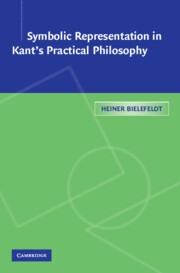Book contents
- Frontmatter
- Contents
- Citations and Translations
- Acknowledgments
- I INTRODUCTION
- II KANT'S SOCRATIC ENLIGHTENMENT
- III THE LAW OF FREEDOM
- IV HOW TO FIND ORIENTATION IN MORAL PRACTICE
- V THE ORDER OF RIGHTS AS A SYMBOL OF HUMAN DIGNITY
- VI TRACES OF PURPOSIVENESS IN NATURE AND HISTORY
- VII SYMBOLISM IN THE PHILOSOPHY OF RELIGION
- VIII CONCLUSION
- Bibliography
- Index
I - INTRODUCTION
Published online by Cambridge University Press: 12 July 2009
- Frontmatter
- Contents
- Citations and Translations
- Acknowledgments
- I INTRODUCTION
- II KANT'S SOCRATIC ENLIGHTENMENT
- III THE LAW OF FREEDOM
- IV HOW TO FIND ORIENTATION IN MORAL PRACTICE
- V THE ORDER OF RIGHTS AS A SYMBOL OF HUMAN DIGNITY
- VI TRACES OF PURPOSIVENESS IN NATURE AND HISTORY
- VII SYMBOLISM IN THE PHILOSOPHY OF RELIGION
- VIII CONCLUSION
- Bibliography
- Index
Summary
The Paradox of Liberalism: A Preliminary Observation
Since its origins in early modernity, liberalism has always been a hotly debated issue. One charge frequently raised is that liberalism mirrors a lack of ethical substance in modern society, a society that seemingly loses its normative cohesiveness, and hence can be held together only by a set of abstract procedural rules. By providing such a formal framework for a modus vivendi within an “atomized society,” liberalism purportedly amounts at best to a minimalist and formalist morality, if not to an ideology of self-centered individuals who are chiefly concerned with their own physical or economic well-being.
This charge of ethical minimalism and abstract proceduralism often goes along with the allegation that liberalism also suffers from a lack of genuinely political purposes. Although, as a matter of fact, liberals have certainly been involved in politics, such political activities are said to derive primarily from nonpolitical interests – that is, private and economic interests that ultimately prevail over republican commitment. From such a point of view, liberalism appears to constitute a bourgeois ideology of “possessive individualism” rather than the joint project of citizens who share some substantial political convictions as the basis of a “strong” participatory democracy.
Finally, modern liberal individuals are often portrayed as having emancipated themselves not only from “thick” ethical and political values, but from all religious and spiritual commitment too.
- Type
- Chapter
- Information
- Publisher: Cambridge University PressPrint publication year: 2003

